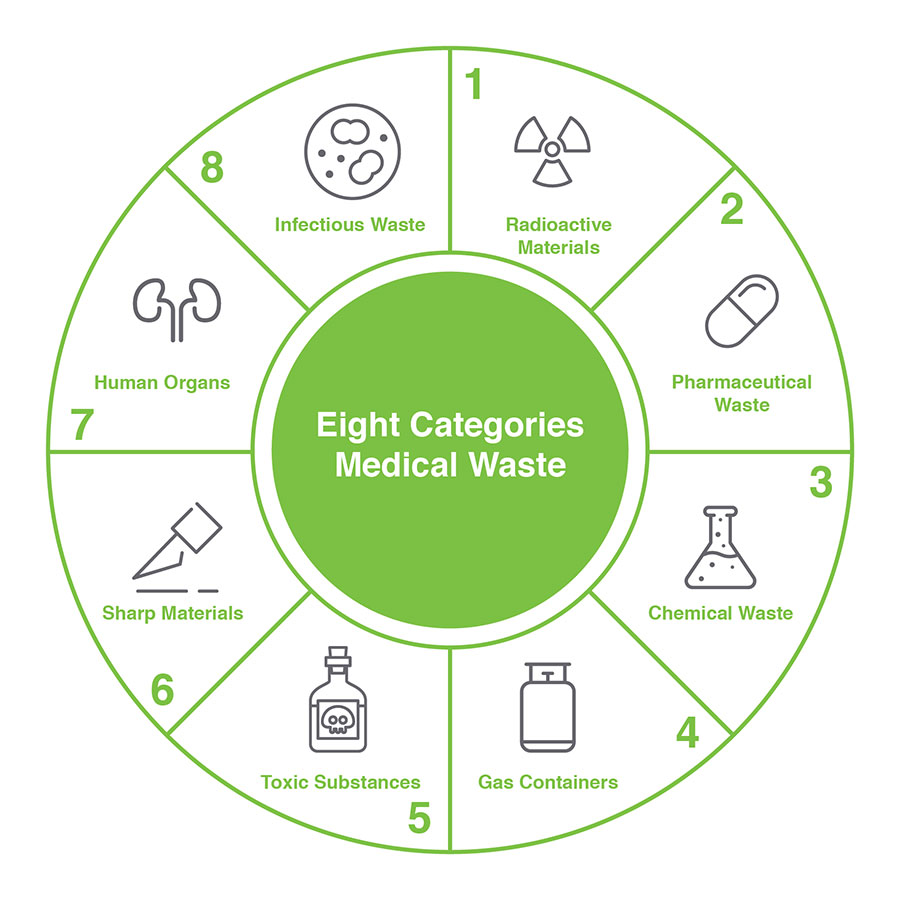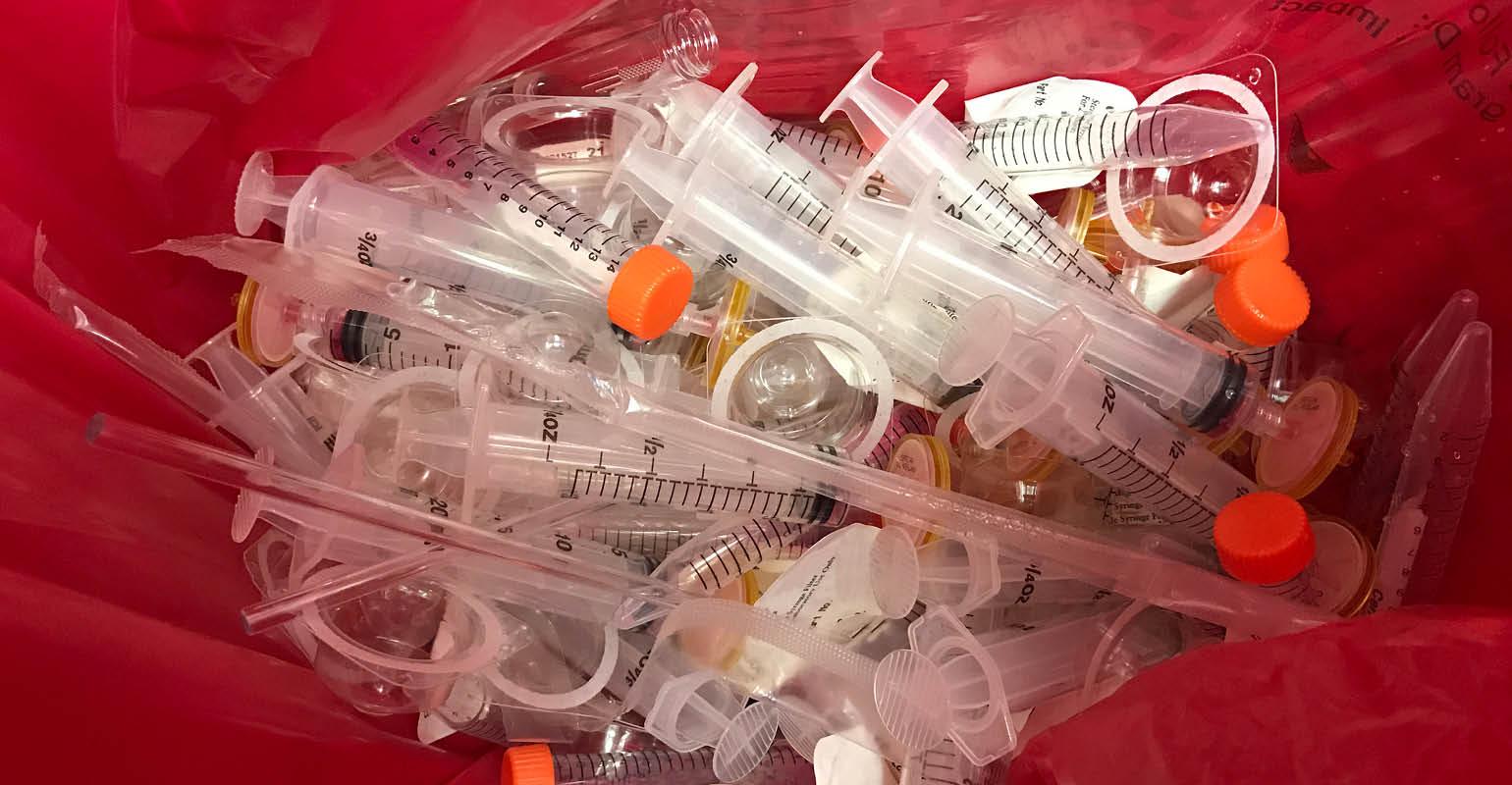Stay Compliant and Safe: How to Throw Away Medical Waste Appropriately
In today's ever-changing healthcare landscape, guaranteeing compliance and security when it comes to clinical waste disposal is of utmost relevance. In this discussion, we will explore the different kinds of clinical waste, the affiliated risks, the legal demands, and the finest methods for keeping a certified and secure clinical waste management system.
Importance of Proper Medical Waste Disposal
Proper medical waste disposal is of utmost significance in guaranteeing the security and wellness of both health care employees and the basic public. Clinical waste, which consists of products such as utilized needles, polluted dressings, and expired medications, positions serious health risks otherwise taken care of and taken care of appropriately.

Furthermore, improper disposal of medical waste can lead to environmental contamination. When clinical waste is not set apart, treated, or disposed of properly, it can find its way right into land fills or bodies of water, possibly polluting the soil, air, or water resources. This can have damaging impacts on communities and human health, as hazardous materials might leach into the setting or be released into the ambience.
Sorts Of Medical Waste and Their Risks
The varied variety of medical waste created by health care facilities offers different risks that have to be meticulously dealt with to ensure correct disposal and stop potential injury to public health and wellness and the environment. Clinical waste can be categorized into various categories based upon its attributes and level of risk.
One sort of medical waste is transmittable waste, which includes things that are polluted with blood or other possibly contagious materials. This can include utilized needles, syringes, and other sharp things, in addition to tissues, swabs, and dressings from people with contagious diseases. Inappropriate disposal of contagious waste can lead to the transmission of hazardous pathogens and the spread of infections.
An additional category is contaminated materials, which consists of materials that are harmful, combustible, corrosive, or reactive. This can consist of chemicals, pharmaceuticals, and specific clinical devices. Mishandling or inappropriate disposal of dangerous waste can lead to ecological contamination and pose dangers to the wellness of waste workers and the public.
Contaminated waste is an additional kind of medical waste that should be very carefully managed. This waste includes products that contain radioactive compounds, such as made use of radiation treatment sources or contaminated lab materials. Inappropriate handling or disposal of radioactive waste can result in radiation exposure and serious health and wellness threats.
Last but not least, non-hazardous basic waste, such as paper, product packaging products, and food waste, is also generated by healthcare facilities. While this waste may not pose significant risks, it still needs to be correctly handled to preserve sanitation and protect against the destination of pests.
To ensure the safe disposal of medical waste, healthcare facilities should execute appropriate segregation, transport, therapy, and storage methods. This consists of utilizing proper containers, labeling, and training for personnel, as well as complying with neighborhood guidelines and guidelines. By dealing with the risks connected with different sorts of medical waste, healthcare centers can secure public health and wellness and the environment.
Lawful and Governing Needs for Disposal
In order to make sure the safe and correct disposal of clinical waste, health care facilities have to abide by legal and governing demands. These requirements remain in place to shield public health and wellness and medical waste disposal services with WasteX the atmosphere from the potential threats connected with clinical waste. Medical waste is classified as an unique category of waste as a result of its prospective to send contagious conditions and consist of damaging substances.

Some typical requirements consist of the segregation and appropriate product packaging of medical waste, making use of authorized labels and containers, and the execution of safe handling and transportation treatments - medical waste removal. Health care centers might additionally be required to preserve documents of their waste management practices and supply documents to regulatory authorities upon demand
Failing to comply with these lawful and governing requirements can result in penalties, fines, and reputational damage for medical care centers. It is, therefore, important for healthcare carriers to prioritize compliance and establish robust waste management protocols to ensure the safe and proper disposal of medical waste.
Finest Practices for Safe Medical Waste Management
Health care facilities must abide by industry ideal practices to make certain the effective and secure monitoring of clinical waste - medical waste disposal services with WasteX. Executing these ideal methods not only assists protect the setting and public health yet likewise lowers the danger of potential legal and economic repercussions
Among the essential ideal practices is the correct segregation and control of different sorts of clinical waste. This includes making use of color-coded containers and clearly identifying them to ensure that each sort of waste is gotten rid of correctly. Furthermore, medical care facilities need to have designated locations for storage space and disposal of medical waste, with clear standards and treatments in position.
An additional essential element of safe medical waste monitoring is the training and education of healthcare personnel. All personnel who manage medical waste needs to receive thorough training on the proper handling, storage, and disposal treatments. It is crucial to make sure that personnel recognize the prospective threats related to medical waste and are furnished with the essential knowledge and skills to handle it safely.
Routine tracking and bookkeeping of waste monitoring techniques is additionally important. This includes on a regular basis assessing waste monitoring treatments, performing inspections, and maintaining accurate records. By keeping an eye on waste administration methods, health care facilities can determine any type of prospective problems or areas for improvement and take corrective actions accordingly.
Lastly, medical care centers need to focus on making use of eco-friendly disposal methods whenever feasible. This consists of using waste treatment technologies such as autoclaving or incineration, which can help in reducing the volume and unsafe nature of clinical waste.
Eco-Friendly Solutions for Medical Garbage Disposal
Executing environmentally friendly services for medical garbage disposal is critical for medical care facilities to reduce environmental influence and guarantee lasting techniques. Standard methods of clinical garbage disposal, such as incineration and landfilling, have been located to release hazardous toxins into the air and infect dirt and water sources. Therefore, there is a growing demand for alternate methods that are both secure and eco-friendly.
One eco-friendly remedy try this website is the implementation of on-site waste therapy systems. These systems make use of innovative technologies to securely process medical waste within the medical care facility itself. By dealing with the waste on-site, transportation discharges and threats connected with off-site disposal are lowered. Furthermore, these systems often utilize innovative sterilization methods, such medical waste disposal services with WasteX as vapor or microwave treatment, to make sure the complete damage of contagious microorganisms.
Another environmentally friendly strategy is the fostering of recycling programs for sure kinds of clinical waste. Products such as glass, plastics, and steels can be recycled instead of disposed of in garbage dumps. By carrying out partition and reusing programs, healthcare facilities can substantially minimize their waste quantity and minimize their environmental footprint.
Moreover, medical care centers can discover making use of multiple-use clinical tools and supplies. By opting for reusable products, instead of single-use choices, the quantity of waste created is dramatically reduced. Reusable items can be sterilized and used multiple times, resulting in cost savings and much less ecological influence.
Verdict
In final thought, proper disposal of clinical waste is important for maintaining conformity and guaranteeing safety. Complying with best methods for safe clinical waste management and discovering environmentally friendly remedies can contribute to a responsible and sustainable strategy to squander disposal in the medical care industry.
In this conversation, we will certainly check out the numerous types of clinical waste, the affiliated threats, the legal needs, and the best methods for keeping a safe and compliant medical waste administration system - medical waste removal near me.One type of medical waste is contagious waste, which consists of items that are contaminated with blood or other possibly transmittable materials.Radioactive waste is one more kind of clinical waste that have to be carefully taken care of. Clinical waste is classified as a special classification of waste due to its prospective to transfer transmittable conditions and include unsafe compounds
Complying with ideal techniques for secure clinical waste administration and checking out eco-friendly services can contribute to a sustainable and accountable method to squander disposal in the health care market. medical waste disposal services with WasteX.